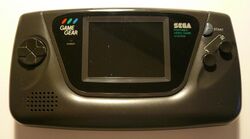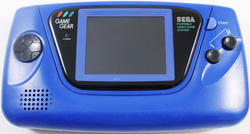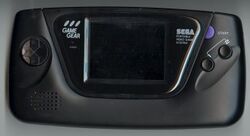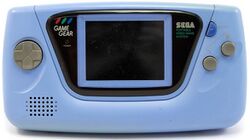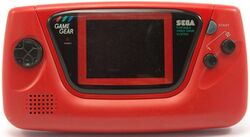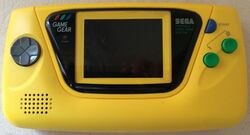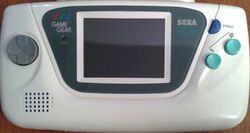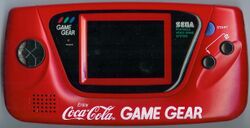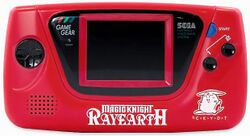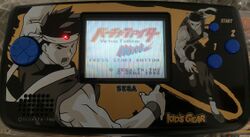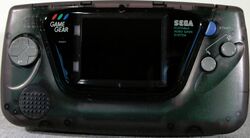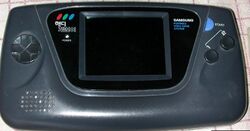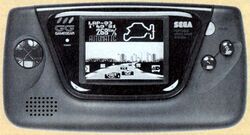Sega Game Gear
From Sega Retro
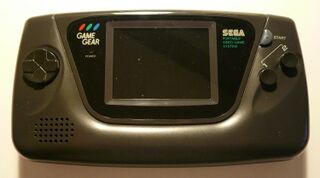
| ||||||||||||||||||||||||||||||||||||||||||||||||||||||||||||||||||||||||||||||||
| Sega Game Gear | ||||||||||||||||||||||||||||||||||||||||||||||||||||||||||||||||||||||||||||||||
|---|---|---|---|---|---|---|---|---|---|---|---|---|---|---|---|---|---|---|---|---|---|---|---|---|---|---|---|---|---|---|---|---|---|---|---|---|---|---|---|---|---|---|---|---|---|---|---|---|---|---|---|---|---|---|---|---|---|---|---|---|---|---|---|---|---|---|---|---|---|---|---|---|---|---|---|---|---|---|---|---|
| Manufacturer: Sega | ||||||||||||||||||||||||||||||||||||||||||||||||||||||||||||||||||||||||||||||||
|
The Game Gear (jp.ゲームギア , il.גיימגיר ) is a handheld video game console developed by Sega and released in late 1990 as a response to Nintendo's Game Boy handheld . It is a full colour console and was Sega's first attempt to compete in the handheld games market (the second being the Sega Nomad — a handheld Mega Drive). In South Korea it is known as the Handy Gam*Boy (핸디겜보이).
Contents
Hardware
The Game Gear is a "portable" device which was designed to address problems with Nintendo's Game Boy. It is held lengthwise at the sides (preventing the cramping of hands which plagued Nintendo's system) and has a backlit, colour LCD screen, allowing for clearer and more vibrant visuals than its main rival.
Similarly to the Mega Drive, which at the time was Sega's main focus in the home console market, the Game Gear is derived from the earlier Sega Master System. Unlike the Mega Drive, however, the Game Gear is largely identical to the Master System, the major difference being a VDP capable of displaying palettes consisting of a wider variety of colors, and the playback of stereo sound. Game Gear games traditionally run at a smaller resolution too, although with a screen built similarly to televisions of the era, the Game Gear is fully capable of playing games in higher resolutions.
Like the Master System, the Game Gear features a D-Pad and two buttons, ![]() and
and ![]() , but also adds a third, START . This is one button short of a Game Boy.
, but also adds a third, START . This is one button short of a Game Boy.
Unfortunately, due to technical limitations of the era, the Game Gear demands six AA batteries to be played on the go, of which the fluorescent backlight on the LCD screen will eat through in three to five hours (though a battery pack provides longer playtime). Furthermore, the system gives off more heat than the Game Boy, often leading to "sweaty palms" after prolonged use. The system was also considered not to be very "portable" - it's bulky size means it does not fit in many pockets, and the power-draining backlight of the LCD screen (which cannot be turned off) meant Game Gears were unusable after a short period of time. An AC adaptor can be plugged into the system so that it runs off the mains, but this was not considered practical for consumers of the day.
Game Gears were also manufactured at a time where capacitor problems were rampant across the electronics industry. As a result, screen and audio failures are common, and fixes are not always simple.
Models
- Main article: Game Gear consoles.
Japanese model (Coca Cola Kid edition (Model #3210CR))
Japanese model (Magic Knight Rayearth edition (Model #HGG-3210 RAY))
Japanese model (Virtua Fighter Mini edition)
Technical specifications
- See Sega Master System specifications for further specifications
The hardware is largely identical to the Sega Master System, with some of the differences mentioned below.
History
- Main article: History of the Sega Game Gear.
Games
- Main article: Sega Game Gear games.
Magazine articles
- Main article: Sega Game Gear/Magazine articles.
Promotional material
- Main article: Sega Game Gear/Promotional material.
Artwork
External links
- Console Database - Sega Game Gear info and FAQs
- SMS Power - Technical information and more on the Game Gear and its bigger brother, the Master System
References
- ↑ GamePro, "May 1991" (US; 1991-xx-xx), page 8
- ↑ 2.0 2.1 GamePro, "May 1991" (US; 1991-xx-xx), page 16
- ↑ Sega Power, "March 1992" (UK; 1992-02-06), page 14
- ↑ Mean Machines, "June 1991" (UK; 1991-05-29), page 11
- ↑ Raze, "September 1991" (UK; 1991-07-25), page 17
- ↑ Ação Games, "Julho 1991" (BR; 1991-07-xx), page 14
| Sega Home Video Game Systems | ||||||||||||||||||||||||||||
| 83 | 84 | 85 | 86 | 87 | 88 | 89 | 90 | 91 | 92 | 93 | 94 | 95 | 96 | 97 | 98 | 99 | 00 | 01 | 02 | 03 | 04 | 05 | 06 | 07 | 08 | 09 | 10 | 11 |
|---|---|---|---|---|---|---|---|---|---|---|---|---|---|---|---|---|---|---|---|---|---|---|---|---|---|---|---|---|
| SG-1000 | SG-1000 II | Mega Drive | Mega Drive II | |||||||||||||||||||||||||
| SC-3000 | Mega-CD | Mega-CD II | Genesis 3 | |||||||||||||||||||||||||
| Sega Mark III | 32X | Dreamcast | ||||||||||||||||||||||||||
| Master System | Master System II | |||||||||||||||||||||||||||
| AI Computer | Game Gear | |||||||||||||||||||||||||||
| Saturn | ||||||||||||||||||||||||||||
| Pico | Beena | |||||||||||||||||||||||||||
| Sega Game Gear | |
| Topics | Sega Game Gear | History | Magazine articles | Promotional material | Merchandise |
|---|---|
| Hardware | Japan | North America | Western Europe | Eastern Europe | Asia | South America | Australasia | Africa Wide Gear | Fun Play 20-in-1 |
| Add-ons | Pro Action Replay | Game Genie | X-Terminator | Master Gear Converter (Gear Master | Nuby Converter) | Stereo FM Tuner | TV Tuner |
| Cases | Carry-All | Deluxe Carry-All Case | Gear Bag | Holster Case | Standard Carrying Case | Soft Case | Third Party (Play & Carry Case) |
| Accessories | A/V Cable | Battery Pack | Car Adaptor | Car Antenna | Cleaning Gear | Gear-to-Gear Cable | PowerBack (Third Party) | Screen Magnifier (Wide Gear | Super Wide Gear | Third-Party) |
| Development Tools | Sega Game Gear Development Board |
- JP Game Gear hardware
- US Game Gear hardware
- DE Game Gear hardware
- ES Game Gear hardware
- FR Game Gear hardware
- PT Game Gear hardware
- UK Game Gear hardware
- SE Game Gear hardware
- IT Game Gear hardware
- CZ Game Gear hardware
- AU Game Gear hardware
- MX Game Gear hardware
- BR Game Gear hardware
- KR Game Gear hardware
- Game Gear hardware
- Sega Game Gear
